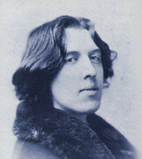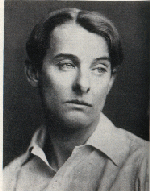A True Friend
Harris and Wilde became aquainted while Harris was editor of the Fortnightly Review. After Wilde had had his essay The Critic As Artist published Harris wrote to him, congratulating him and telling him that this essay had changed his mind about him: previously he had 'done him wrong in his thoughts', but now recognised him as a great writer and thinker. From this point onward Harris would champion Wilde and be a true friend to him. For example, Harris would defend Lady Windermere's Fan as 'the best comedy in English' against the snide and unpleasant consensus of the London theatre critics of the time.
 When Wilde was considering the ill-fated libel suit against Queensberry, Harris warned him against it, advising him instead to flee to Paris. Harris foresaw that Queensberry as a father supposedly acting to protect his son against a corrupting older man would inevitably have the sympathy of the court. But Wilde, spurred on by Lord Alfred Douglas, did not take the advice.
When Wilde was considering the ill-fated libel suit against Queensberry, Harris warned him against it, advising him instead to flee to Paris. Harris foresaw that Queensberry as a father supposedly acting to protect his son against a corrupting older man would inevitably have the sympathy of the court. But Wilde, spurred on by Lord Alfred Douglas, did not take the advice.
Again, when Wilde was on bail between the second and the final of his trials, Harris, believing in Wilde's innocence, proposed some new lines of defence. Wilde confessed his guilt. Harris, unabashed, obtained the use of a steam yacht for Wilde to escape to France, but Wilde was seemingly determined to meet his doom head-on.
While Wilde was in prison Harris was one of those who tried to get up a petition on his behalf, to ask that his conditions be improved and that he be permitted access to writing materials. Harris was dismayed by the lack of enthusiasm shown by the writers he approached, who included Thomas Hardy and George Meredith.
When Wilde was released, Harris proposed that they should take a trip to the Pyrenees together. Wilde did not take up his offer, but a few years later they did spend three months in the South of France, though Harris was largely absent in Monaco, buying a hotel.
Wilde had the idea for a play, Mr and Mrs Daventry, which he sold to Harris for £100. Harris wrote the play and it was produced in the West End where it enjoyed a modest success, not unaided by the rumour that Wilde had actually written part of it himself. However, Harris was alarmed to discover that Wilde had also sold the same idea to a number of others, who had to be paid off. Worse was that Wilde was annoyed at Harris' action, as the idea could then no longer be sold to anyone else.
A Not-So-True Biography
Twenty years after Wilde's death, Harris published his biography. Harris needed the money, but all the same in his way he attempted to do justice to his old friend. It is actually not as inaccurate as often has been implied. The principal faults it exhibits are, firstly, a failure to do much research, so that Wilde's early manhood for example is covered very skimpily. Secondly, Harris tends to exaggerate his role in events, sometimes reporting that he was present when he could not have been. Thirdly, he fails to reproduce convincingly Wilde's mode of speech: Wilde in his account speaks like an aesthetic Harris (if such a thing can be imagined).
For all its faults, the Life and Confessions does succeed in portraying the strange friendship of two very different men.
Harris and Douglas at Odds
 When Harris wanted to publish the Wilde biography in England, there was an obvious problem. His descriptions of the actions and motives of Lord Alfred Douglas were potentially libellous. Harris proposed to resolve the problem by writing a new preface and adding footnotes to the text. He managed to get hold of Douglas and persuade him to go along with this. Initially things went well enough, with Harris made to believe that Wilde and Robert Ross had done Douglas an injustice which the changes to the book would rectify. The two of them composed a preface that both were happy with. However when Harris had the chance to check some matters he found that Douglas had misled him, and he revised the preface accordingly. This led to a complete breakdown of relations between them, with Douglas publishing the original text of the preface and Harris still unable to sell his Wilde in England.
When Harris wanted to publish the Wilde biography in England, there was an obvious problem. His descriptions of the actions and motives of Lord Alfred Douglas were potentially libellous. Harris proposed to resolve the problem by writing a new preface and adding footnotes to the text. He managed to get hold of Douglas and persuade him to go along with this. Initially things went well enough, with Harris made to believe that Wilde and Robert Ross had done Douglas an injustice which the changes to the book would rectify. The two of them composed a preface that both were happy with. However when Harris had the chance to check some matters he found that Douglas had misled him, and he revised the preface accordingly. This led to a complete breakdown of relations between them, with Douglas publishing the original text of the preface and Harris still unable to sell his Wilde in England.
While Douglas and Harris were on speaking terms, Douglas wrote a confessional letter to Harris in which he admitted to having had a physical relationship with Wilde. It closes with the sentence, extraordinary given the frankness of Douglas' confession, "you are at liberty to make any use you like of this letter and I have no objection to its being published". In 1930, when Harris was really desperate for cash, he brought out a new American edition of the Wilde biography, adding a new preface in which he published this letter and another, tamer, one from Douglas. Douglas, needless to say, was incensed, as it showed him up for the hypocrite and liar he was. (I learn from a correspondent who has seen the original of this letter that Harris actually cut some matter from it, as being too graphic in its description even for his readership!)
The High Moral Tone of Hesketh Pearson
In an interesting further twist to all this, Hesketh Pearson was one of Harris' disciples for a while, until the usual disillusionment set in. Harris introduced Pearson to Bernard Shaw, who would later become the subject of a biography by Pearson. In his life of Shaw, Pearson devotes a chapter to Harris, who by this time he saw as something of a bête noire. Pearson recounts the episode with Douglas and the preface, with the intention to convey how shoddy Harris' approach as a biographer was, implying that Harris was in the wrong and Douglas in the right. The irony is that Harris had done no more than name Douglas as Wilde's accomplice in the homosexual activities that brought about Wilde's downfall. This might have not been what Douglas wanted put about, but it was hardly unfair. No doubt Pearson let his feelings about Harris cloud his judgement.
Pearson grew less bitter about Harris as he got older. In his own biography of Wilde he is much softer on Harris, and by the time he wrote his autobiography Hesketh Pearson by Himself (sadly out of print but heartily recommended) he had become rather fond of the old rogue.
Comments